Happiness after 50
Part of the Life Well Spent Report 2024
They’re called our ‘golden years’ for a reason, but how much happier are we in later life?

Happiness rises with age
When asked over 50s to rate “how satisfied are you with your life as a whole nowadays” out of 10, a decisive 72% answered 6 or above (+3% from 2023). In fact, 41% rated their life satisfaction an 8, 9 or 10 (+3% since 2023).
Happiness appears to rise both with age and upon retirement, with 52% of over 70s (+1% from 2023) and 52% of retirees (+3% from 2023) scoring 8 or higher for overall life satisfaction.
Which over 50s are happiest...
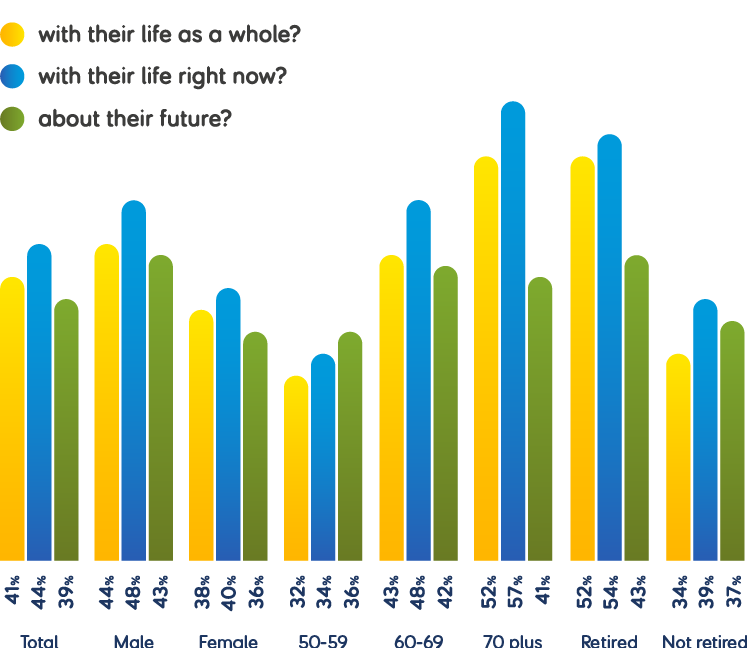
The data is as follows:
- Total. With their life as a whole? 41%. With their life right now? 44%. About their future? 39%.
- Male. With their life as a whole? 44%. With their life right now? 48%. About their future? 43%.
- Female. With their life as a whole? 38%. With their life right now? 40%. About their future? 36%.
- 50-59. With their life as a whole? 32%. With their life right now? 34%. About their future? 36%.
- 60-69. With their life as a whole? 43%. With their life right now? 48%. About their future? 42%.
- 70 plus. With their life as a whole? 52%. With their life right now? 57%. About their future? 41%.
- Retired. With their life as a whole? 52%. With their life right now? 54%. About their future? 43%.
- Not retired. With their life as a whole? 34%. With their life right now? 39%. About their future? 37%.
Similar results can be seen when asked “how happy did you feel yesterday?”, with 57% of over 70s reporting high happiness (+2% from 2023).
Looking forward, 39% of over 50s feel very positive about their future (+4% since 2023), and only 16% (-3%) rated their outlook between 1 and 4 out of 10. Again, the over 70s and retirees showed the most optimism, with 41% and 43% respectively feeling very happy about the future.
The happiest region is Wales, where 53% feel very happy in their lives overall. The least happy regions are East Anglia and Northern Ireland, where only 35% feel the same.
What brings you the most happiness?
When asked what three things make them happiest in life, the most popular answer is family and friends (91%). Second is money/security (17%), and third is our partners (15%). Joint fourth at 14% is our health and our pets.
But, like last year, it isn’t having lots of money that makes people happy. It’s financial security and being free from money worries. As one respondent said, it’s about “having enough money to be comfortable.”
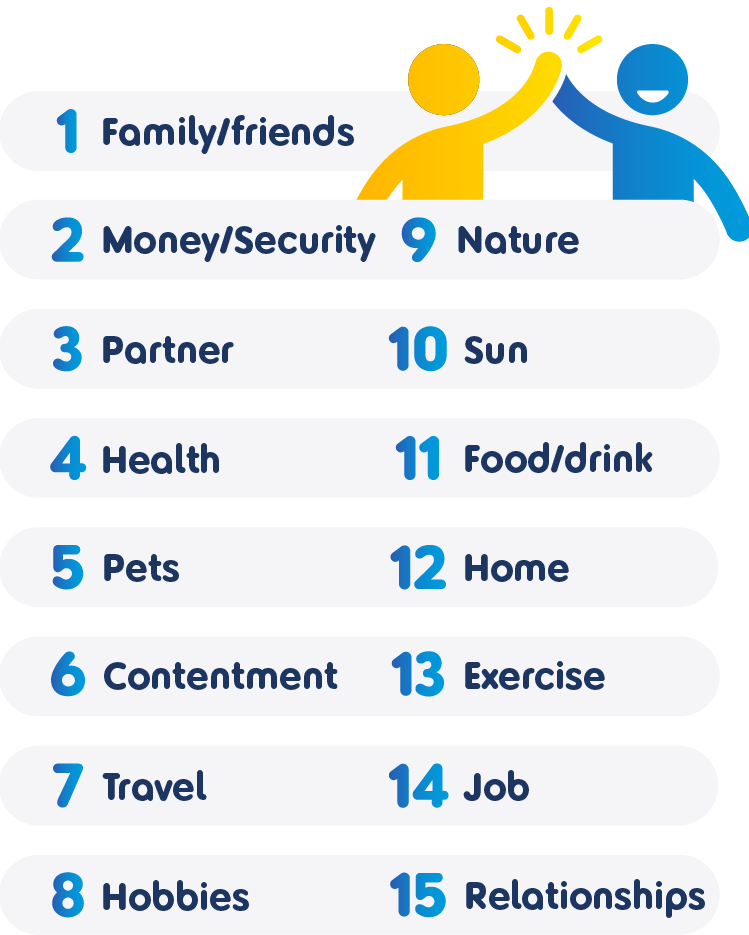
The data is as follows:
- Family/friends
- Money/security
- Partner
- Health
- Pets
- Contentment
- Travel
- Hobbies
- Nature
- Sun
- Food/drink
- Home
- Exercise
- Job
- Relationships
Travel (mentioned by 11% of respondents), hobbies (9%), nature (7%) and sunshine (7%) all made it into the top 10. And like last year, many over 50s reported spending time in their gardens as bringing them the most happiness.
Good food and drink just missed out on the top 10 in 11th place, with cheese, chocolate, beer and biscuits all getting a mention.
Does retirement make us happier?
Overall, retiring improves people’s happiness in both the long term (66% – the same as in 2023) and short term (68% – up 1% since 2023). Like last year, only around 1 in 10 feel less happy since retiring.
How retirement affects happiness in over 50s who are retired...
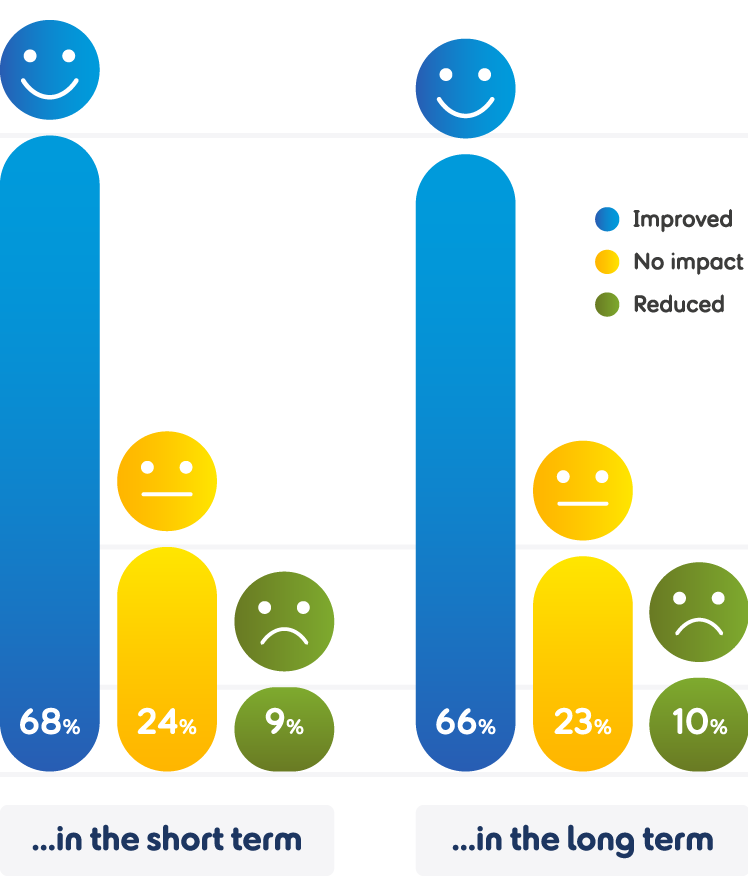
The data is as follows:
- ...in the short term. 68% Improved. 24% No impact. 9% Reduced.
- ...in the long term. 66% Improved. 23% No impact. 10% Reduced.
3 in 4 feel confident they retired at the right age, rising to 84% for the happiest people over 50. But 18% feel they retired too early – up 4% since 2023. One reason for this could be the higher cost of living, which is continuing to impact retirement funds. And over 1 in 4 (27%) of retirees only have a State Pension.
Did you retire at the right age?
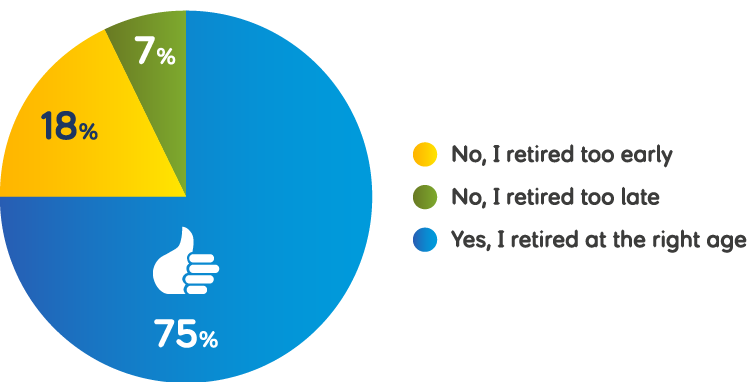
The data is as follows:
- No, I retired too early 18%.
- No, I retired too late 7%.
- Yes, I retired at the right age 75%.
Overall, those who’ve retired report better physical health, having more time to do what they want, and spending time with loved ones.
But others report feeling isolated, lonely or bored, missing work and their colleagues, and not having as much money coming in.
How has retirement made you happy?
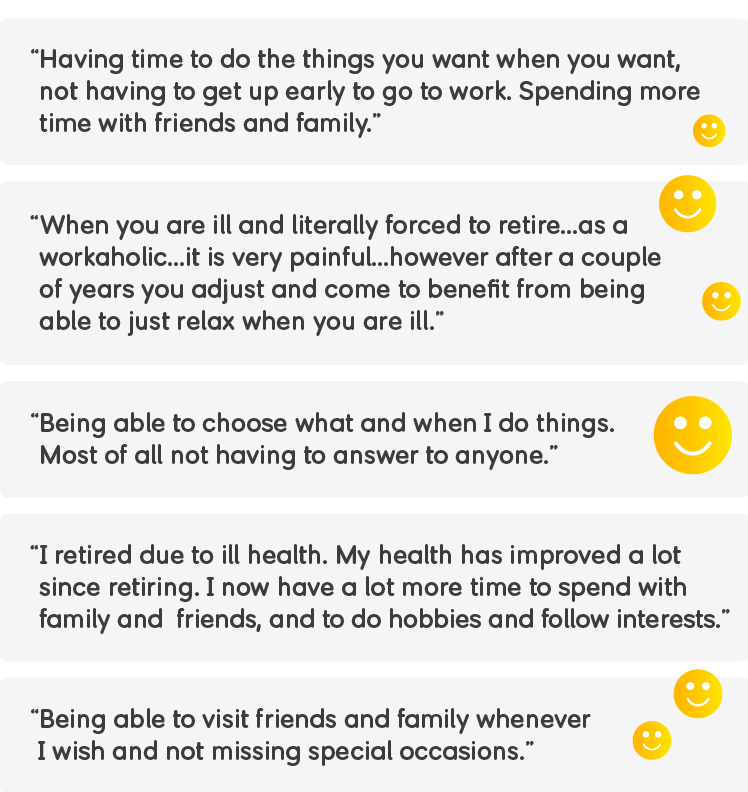
"Having time to do the things you want when you want, not having to get up early to go to work. Spending more time with friends and family." "When you are ill and literally forced to retire... as a workaholic... it is very painful... however after a couple of years you adjust and come to benefit from being able to relax when you are ill." "Being able to choose what and when I do things. Most of all not having to answer to anyone," "I retired due to ill health. My heath has improved a lot since retiring. I now have a lot more time to spend with family and friends, and to do hobbies and follow interests." "Being able to visit friends and family whenever I wish and not missing special occasions."
When do people retire?
The average retirement age is 61, which is also the average age retirees wish they‘d retired at. Interestingly, this is the average retirement age for both the happiest and the least happy over 50s. Those yet to retire would like to do so at an average age of 66.
Over half of respondents who have retired did so before reaching the State Pension age (54%) – the same as in 2023. But 12% delayed their retirement to continue working full time (+1%), and 6% continued working part time (-1%).
However, men retire earlier on average, with 58% retiring before State Pension age compared to 49% of women.
What age did you retire?
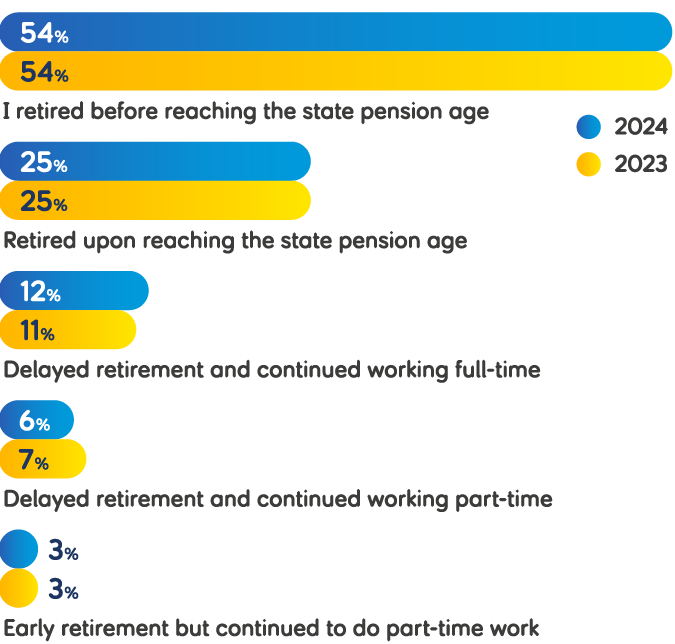
The data is as follows:
- I retired before reaching the state pension age. 54% 2024 and 2023.
- Retired upon reaching the state pension age. 25% 2024 and 2023.
- Delayed retirement and continued working full-time. 12% 2024. 11% 2023.
- Delayed retirement and continued working part-time. 6% 2024. 7% 2023.
- Early retirement but continued to do part-time work. 3% 2024 and 2023.
Retirement age: men and women
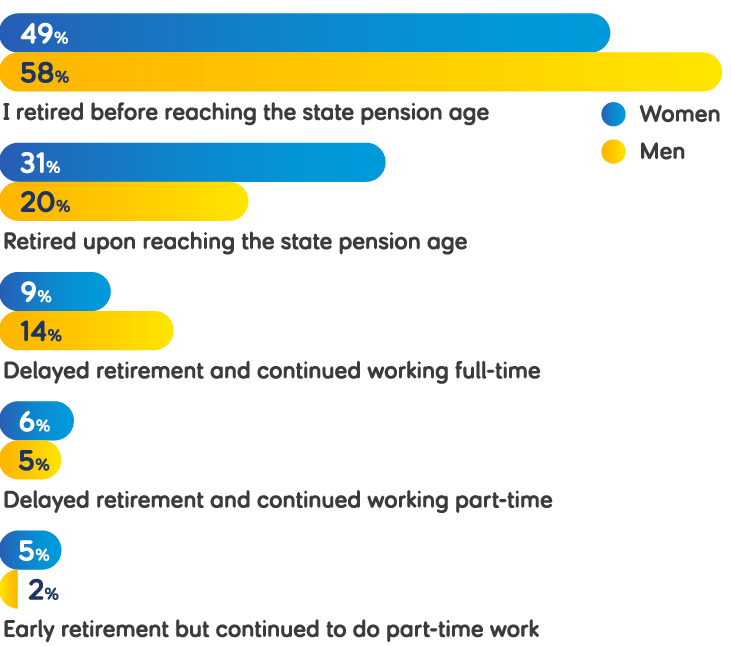
The data is as follows:
- I retired before reaching the state pension age. 49% Women. 58% Men.
- Retired upon reaching the state pension age. 31% Women. 20% Men.
- Delayed retirement and continued working full-time. 9% Women. 14% Men.
- Delayed retirement and continued working part-time. 6% Women. 5% Men.
- Early retirement but continued to do part-time work. 5% Women. 2% Men.
Most would like to delay retirement
Of those yet to retire, 33% plan to retire before reaching the State Pension age – 9% more than last year. 34% (-3%) plan to retire at the State Pension age. And 34% again would like to delay retirement and continue working – 18% part time, and 16% full time.
When are you planning to retire?
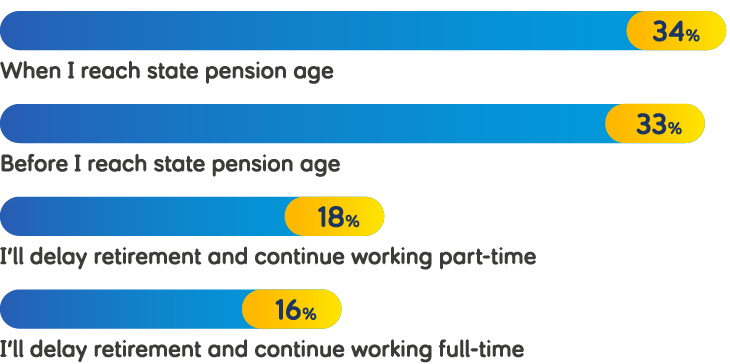
The data is as follows:
- When I reach state pension age. 43%.
- Before I reach state pension age. 33%.
- I'll delay retirement and continue working part-time. 18%.
- I'll delay retirement and continue working full-time. 16%.
Surprisingly, if money was no object, close to half (45%) of those yet to retire would still choose to continue working for as long as they can. That’s a rise of 6% since 2023. 29% would continue part time, and 16% would continue full time. And 55% would retire early to pursue their hobbies if money wasn’t an issue.
If money was no object...
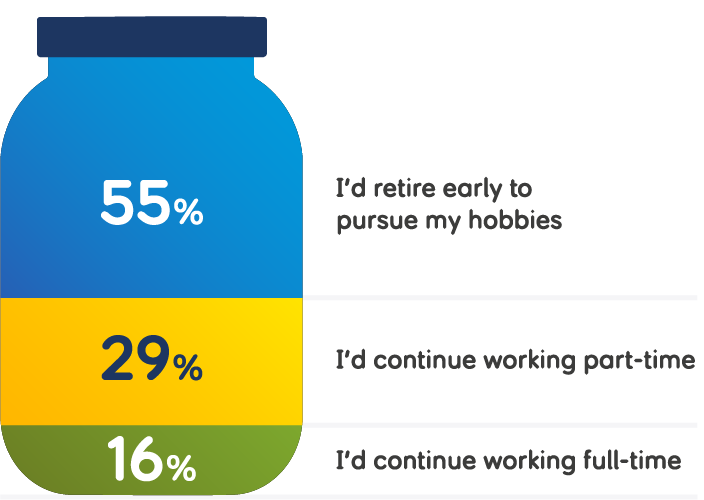
The data is as follows:
- 55% I'd retire early to pursue my hobbies.
- 29% I'd continue working part-time.
- 16% I'd continue working full-time.
This article forms part of our Life Well Spent report, which looks at the relationship between happiness and big purchases in later life. You can read the other sections of the report below or download the full report (PDF).
